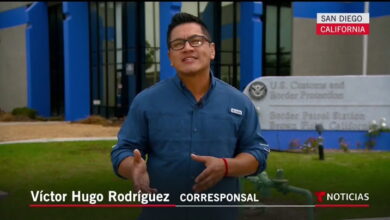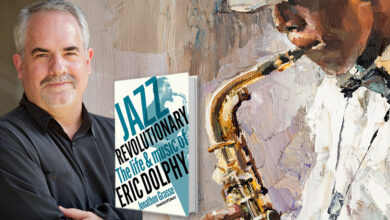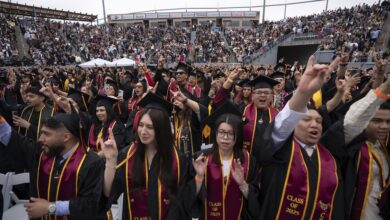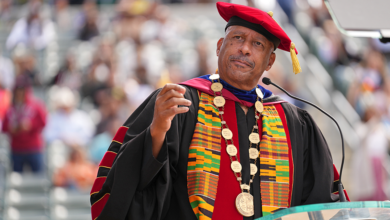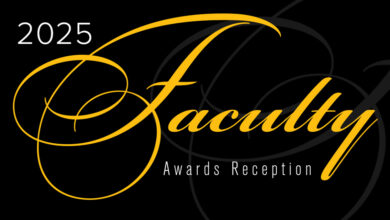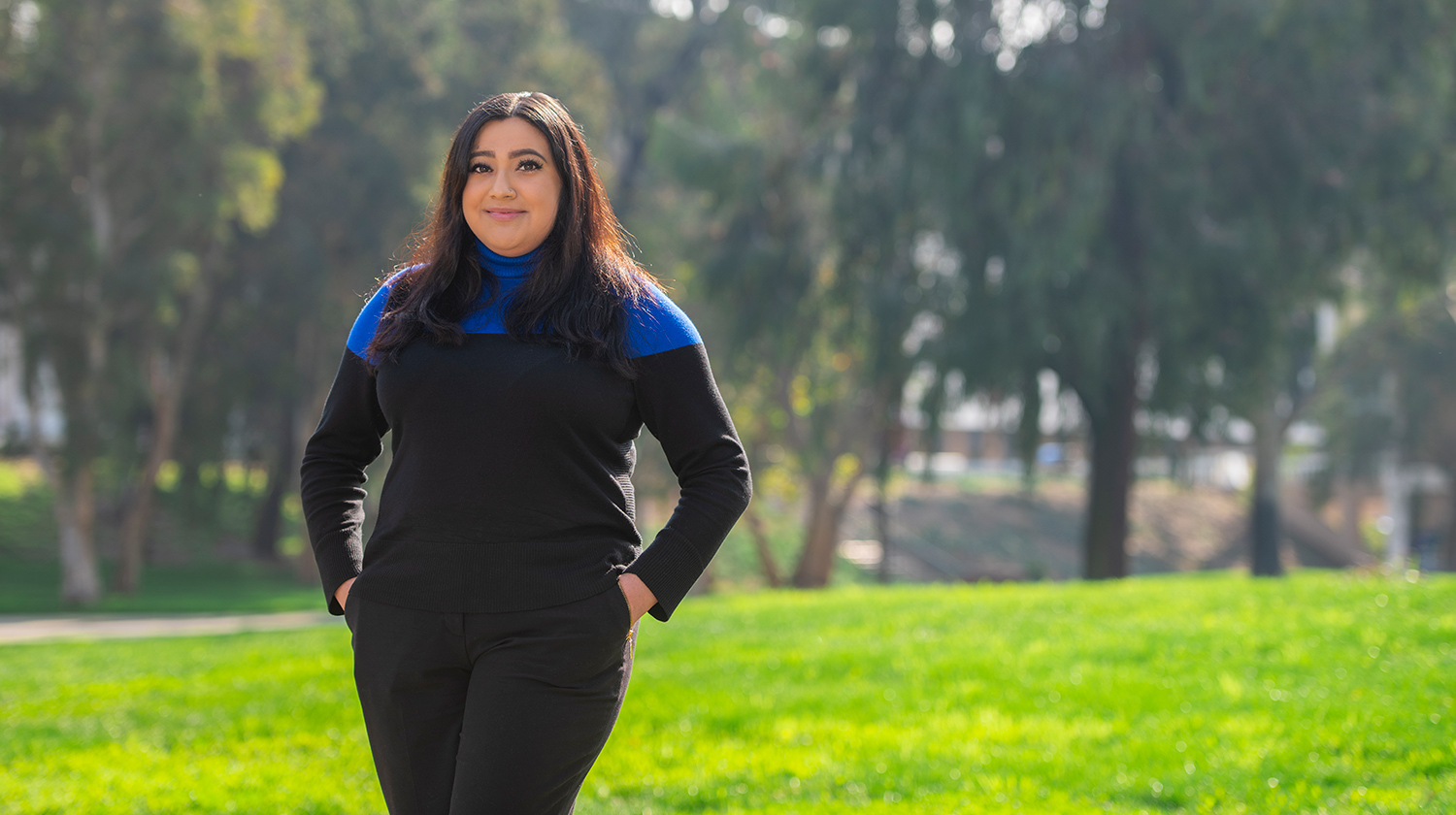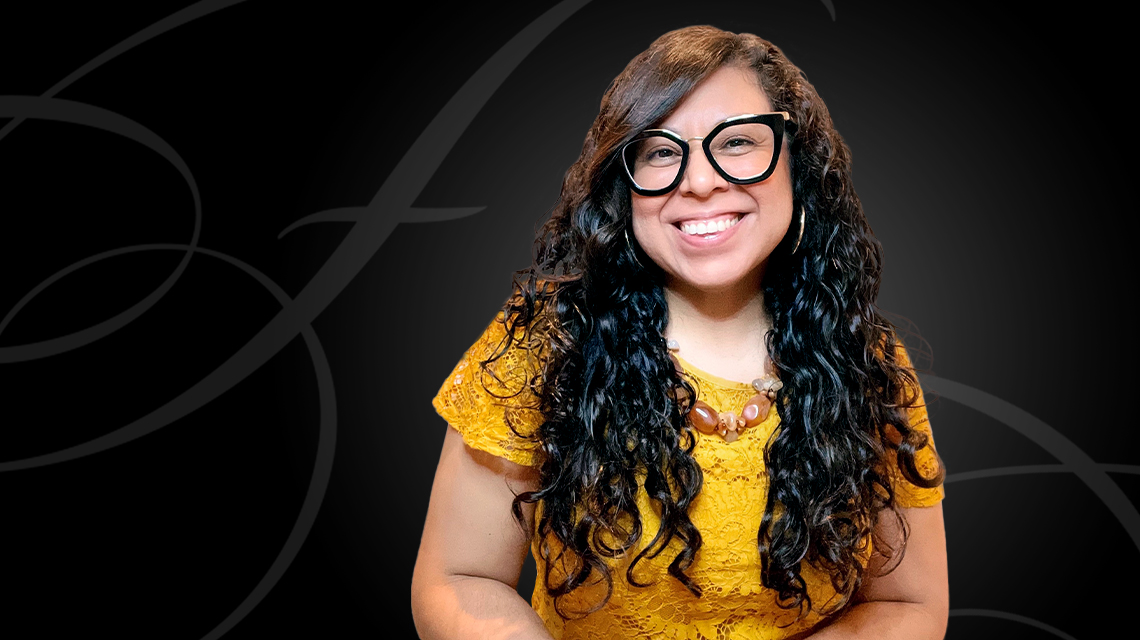
As the daughter of Guatemalan immigrants, Joanna Perez understands first-hand the struggles that immigrant communities undergo due to structural inequality. In her role as an assistant professor of sociology at CSUDH, Perez uses her research, teaching, and service to highlight the various social issues that impact immigrant communities and to advocate for social change.
“When I first began my educational journey, I would have never thought I’d end up as a sociology professor,” says Perez, “but honestly it’s been the best decision of my life. Doing the kind of work that I get to do through sociology, particularly at Dominguez Hills, is very rewarding.”
Perez’ dedication to and research on immigrant communities has earned her the 2021 Excellence in Research, Scholarship and Creative Activity Award. The award acknowledges research, scholarship, and creative activities that are essential components of the university’s mission. The honor also recognizes professional activities that provide intellectual stimulation and motivation for student learning.
“It’s an honor,” says Perez. “We know that the work of every professor at DH is extremely important and necessary. Receiving this award is meaningful because it recognizes the importance of doing research that accounts for the needs, strengths, and contributions of the immigrant community. As a junior faculty member, receiving this award motivates me to continue to do research that intentionally aims to address issues of social justice. And it feels incredible to know that I am at an institution that recognizes the importance of this work.”
Perez received her B.A. in sociology from UCLA, with a double minor in civic engagement and labor and workplace studies. She then went on to graduate school at the University of Illinois, Urbana-Champaign, where she earned a master’s and a Ph.D. in sociology. Perez joined the CSUDH faculty in fall 2016.
Perez’ research on the lived experiences of undocumented immigrant activists earned her a prestigious Woodrow Wilson Career Enhancement Fellowship in 2019, and is the ongoing focus of her scholarship. “I’m committed to using my research to really think about and find ways to alter the social conditions of marginalized communities, particularly those who are oppressed because of their race, class, gender, immigration status, and other identities. In the process, I keep in mind CSUDH’s mission, to promote scholarship that is accessible and transformative.”
Her work contextualizes immigrant experiences through ethnography, a method of exploring cultural phenomena from the point of view of the subject of the study. To that end, Perez immerses herself in their experiences through participant observation while at rallies, organizational meetings, and by collaborating with centers such as the Toro Dreamers Success Center.
A large part of Perez’ work involves engaging with the community and learning about their grass-roots organizing. She also conducts in-depth interviews, aiming to understand immigrant experiences through their lens and their own words.
“I aim to tell the story of who they are, not only as folks who’ve been ascribed the status of undocumented immigrants, but who are also these amazing human beings, who despite being subjected to structural inequality and systemic racism, are resilient and powerful. I want to make sure that I reveal the ways in which undocumented youth who have been historically stigmatized are capable of using activism not only to rectify, but to potentially reverse, these inferior positions that they’ve been given by society.”
Perez’ research has also led her to online social media platforms. “In addition to activism on the ground, that’s where activism is happening now,” she says. “I incorporate virtual ethnography in order to analyze the ways in which undocumented youth are using social media as a platform to continue fighting for immigrant rights and humanizing their experience in an accessible way.”
Engaging with Students and the Community
In her teaching, Perez stresses ‘sociological imagination’ to her students. “That means the connection between history and biography,” she explains. “I strive to have students draw from an intersectional lens to understand the ways in which the course material relates to their personal experiences, their community, and the larger society.”
Perez facilitates this process through what she calls “learning through biography.” It is a pedagogical approach that encourages students to take ownership of their own learning process, drawing from their own personal experiences and histories, and connecting them to the coursework.
“Through a student-centered learning environment, I want to make sure that students recognize that their voices and experiences are critical to knowledge production. Each week, we reflect on everything we’ve been learning by sharing how it applies to our lives,” says Perez, “and to recognize the power of their resilience as well as their role in creating social change.”
Perez also works to connect her work with the surrounding communities. “That’s a big part of the work that we all do,” she says. “Our research, how we approach service, and how we integrate the work of the community in our curriculum are all tied to together. I am purposeful in engaging with the community though research collaborations, service commitments, and enhancing my curriculum so that it reflects what’s going on in the larger society.”
For Perez, this kind of community engagement is at the center of her scholarship. Her own experiences as the daughter of immigrants have taught her the importance of using her position to make positive changes in the community. “One of the main reasons I became a professor is to be able to engage with the community,” she says. “That’s one thing that makes being at CSUDH so special. It’s a university that is very much centered around building a sense of community and addressing the needs of surrounding communities.”
Building these kind of connections are integral to Perez’ work, and a key to why she enjoys working at CSUDH so much. “As a first-generation scholar and professor, and a daughter of immigrants, I get to work in a place where I share similar experiences with my students and folks across campus.”
“What I love about CSUDH is being able to build these spaces where we can learn alongside each other. Where, through our collective experiences, we fight for social change. It truly is a very special place. When I think about my experience at other campuses, nothing compares to DH. The love that we have, the resilience that we showcase, and the opportunity we have to learn from so many brilliant minds is phenomenal! It’s exciting and truly an honor to be part of the Toro community.”


